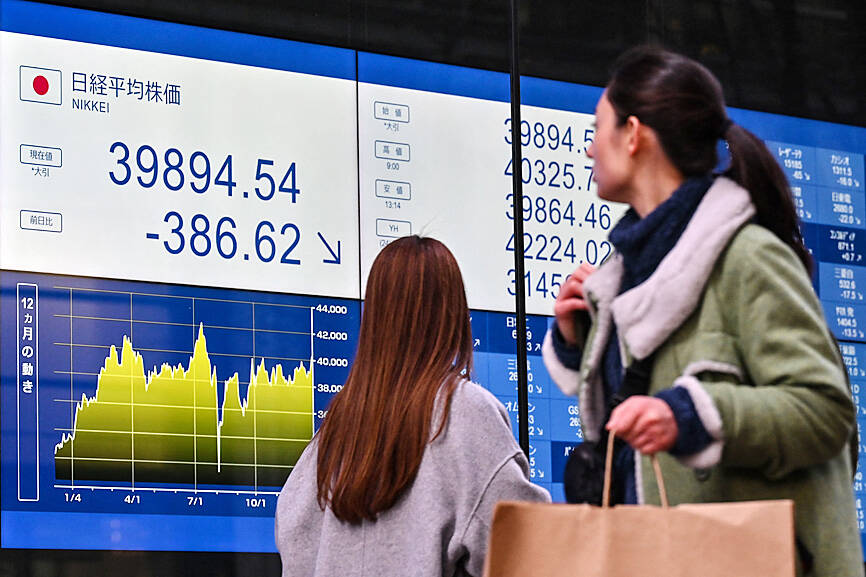Global shares yesterday retreated in thin trading as the year was ending.
Tokyo’s benchmark Nikkei 225 index ended 1 percent lower, at 39,894.54 points. The last trading session of the year ended on a somber note with the Japan Exchange Group CEO Hiromi Yamaji apologizing during the traditional year-end ceremony over a recent insider trading case.
“I acknowledge trust toward the market is essential for investors to trade with confidence,” Yamaji said.

Photo: AFP
The exchange is working to improve training and verify findings of an independent investigation, he said, adding that “we are doing are our utmost best to rebuild trust and prevent this from happening again.”
Overall, the Nikkei 225 index gained about 20 percent this year, finally surpassing the high seen before Japan’s asset bubble burst in the 1990s.
The yen was little changed after hitting 157.89 against the US dollar on Thursday, the lowest in almost six months.
South Korea’s KOSPI dropped 0.2 percent to 2,399.49 and shares of Jeju Air Co lost 8.7 percent after one of the company’s jets skidded off a runway, slammed into a concrete wall and burst into flames on Sunday, killing 179 of the 181 people aboard.
Another Jeju Air flight had to return after encountering a landing gear problem yesterday, the airline said.
Authorities ordered an inspection of all Boeing Co 737-800 aircraft operated by the country’s carriers.
The disaster was yet another blow for Boeing in a dispiriting year, following a machinists’ strike, further safety problems with its troubled top-selling aircraft and plunging stock price.
The TAIEX in Taipei was down 0.37 percent at 23,190.20.
“The TAIEX was again guided by US markets, with electronics stocks largely weaker,” Concord Securities Co (康和證券) analyst Kerry Huang (黃志祺) said.
“As many foreign institutional investors have not returned, turnover was light, leaving the TAIEX in consolidation,” Huang said.
The Hang Seng in Hong Kong lost 0.2 percent at 20,041.42, while the Shanghai Composite index gained 0.2 percent to 3,407.33. Australia’s S&P/ASX 200 dipped 0.3 percent to 8,235.00.
On Friday, the S&P 500 fell 1.1 percent. About 90 percent of stocks in the benchmark index lost ground, but it managed to hold onto a modest gain of 0.7 percent for the week.
The Dow Jones Industrial Average fell 0.8 percent and the tech-heavy NASDAQ composite fell 1.5 percent.
The losses were worsened by sharp declines for big tech stocks known as the “Magnificent 7,” which can heavily influence the direction of the market because of their large size.
Despite Friday’s drop, the market is moving closer to another standout annual finish. The S&P 500 is on track for a gain of about 25 percent this year. That would mark a second consecutive yearly gain of more than 20 percent, the first time that has happened since 1997-1998.
Additional reporting by CNA and AFP

Anna Bhobho, a 31-year-old housewife from rural Zimbabwe, was once a silent observer in her home, excluded from financial and family decisionmaking in the deeply patriarchal society. Today, she is a driver of change in her village, thanks to an electric tricycle she owns. In many parts of rural sub-Saharan Africa, women have long been excluded from mainstream economic activities such as operating public transportation. However, three-wheelers powered by green energy are reversing that trend, offering financial opportunities and a newfound sense of importance. “My husband now looks up to me to take care of a large chunk of expenses,

SECTOR LEADER: TSMC can increase capacity by as much as 20 percent or more in the advanced node part of the foundry market by 2030, an analyst said Taiwan Semiconductor Manufacturing Co (TSMC, 台積電) is expected to lead its peers in the advanced 2-nanometer process technology, despite competition from Samsung Electronics Co and Intel Corp, TrendForce Corp analyst Joanne Chiao (喬安) said. TSMC’s sophisticated products and its large production scale are expected to allow the company to continue dominating the global 2-nanometer process market this year, Chiao said. The world’s largest contract chipmaker is scheduled to begin mass production of chips made on the 2-nanometer process in its Hsinchu fab in the second half of this year. It would also hold a ceremony on Monday next week to

TECH CLUSTER: The US company’s new office is in the Shalun Smart Green Energy Science City, a new AI industry base and cybersecurity hub in southern Taiwan US chip designer Advanced Micro Devices Inc (AMD) yesterday launched an office in Tainan’s Gueiren District (歸仁), marking a significant milestone in the development of southern Taiwan’s artificial intelligence (AI) industry, the Tainan City Government said in a statement. AMD Taiwan general manager Vincent Chern (陳民皓) presided over the opening ceremony for the company’s new office at the Shalun Smart Green Energy Science City (沙崙智慧綠能科學城), a new AI industry base and cybersecurity hub in southern Taiwan. Facilities in the new office include an information processing center, and a research and development (R&D) center, the Tainan Economic Development Bureau said. The Ministry

ADVERSARIES: The new list includes 11 entities in China and one in Taiwan, which is a local branch of Chinese cloud computing firm Inspur Group The US added dozens of entities to a trade blacklist on Tuesday, the US Department of Commerce said, in part to disrupt Beijing’s artificial intelligence (AI) and advanced computing capabilities. The action affects 80 entities from countries including China, the United Arab Emirates and Iran, with the commerce department citing their “activities contrary to US national security and foreign policy.” Those added to the “entity list” are restricted from obtaining US items and technologies without government authorization. “We will not allow adversaries to exploit American technology to bolster their own militaries and threaten American lives,” US Secretary of Commerce Howard Lutnick said. The entities